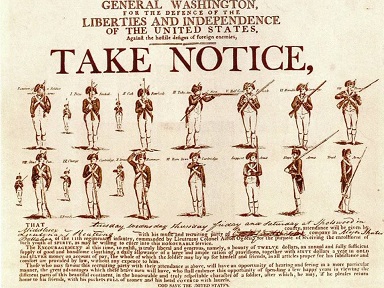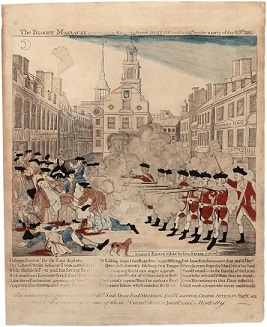Recruiting
Q.Did the army actively recruit, and by what means?
Arun Kosaraju, Muncie, Indiana
A.The army did actively recruit. Below are excerpts from a first-hand account by one of the recruiters, Captain Alexander Grayson, who published his Memoirs of a Life Chiefly passed in Pennsylvania within the last Sixty Years in 1811:
"The object now was to raise my company, and as the streets of the city had been pretty well swept by the preceding and contemporary levies, it was necessary to have recourse to the country. My recruiting party was therefore sent out in various directions; and each of my officers as well as myself, exerted himself in the business . . ."
As Grayson relates, recruitment was no easy task, and he describes a fistfight that ensued after attempting to recruit some tipsy revelers in a tavern.
" . . . A number of fellows at the tavern, at which my party rendezvoused, indicated a desire to enlist, but although they drank freely of our liquor, they still held off. I soon perceived that the object was to amuse themselves at our expense, and that if there might be one or two among them really disposed to engage, the others would prevent them. One fellow in particular, who had made the greatest shew of taking the bounty, presuming on the weakness of our party, consisting only of a drummer, corporal, my second lieutenant and myself, began to grow insolent, and manifested an intention to begin a quarrel, in the issue of which, he no doubt calculated on giving us a drubbing. The disgrace of such a circumstance, presented itself to my mind in colors the most dismal, and I resolved, that if a scuffle should be unavoidable, it should, at least, be as serious as the hangers which my lieutenant and myself carried by our sides, could make it. Our endeavor, however, was to guard against a contest; but the moderation we testified, was attributed to fear. At length the arrogance of the principal ruffian, rose to such a height, that he squared himself for battle and advanced towards me in an attitude of defiance. I put him by, with an admonition to be quiet, though with a secret determination, that, if he repeated the insult, to begin the war, whatever might be the consequence. The occasion was soon presented; when taking excellent aim, I struck him with the utmost force between the eyes and sent him staggering to the other end of the room. Then instantly drawing our hangers, and receiving the manful co-operation of the corporal and drummer, we were fortunate enough to put a stop to any further hostilities. It was some time before the fellow I had struck, recovered from the blow, but when he did, he was quite an altered man. He was as submissive as could be wished, begging my pardon for what he had done, and although he would not enlist, he hired himself to me for a few weeks as a fifer, in which capacity he bad acted in the militia; and during the time he was in this employ, he bore about the effects of his insolence, in a pair of black eyes. "
Grayson reflects on the altercation, noting that, contrary to popular misconception (even in 1811, just a few decades after the war) it was by and large the wealthy elites fired up with indignation against the British crown. The common men and women of the colonies were largely indifferent, rendering the task of recruitment considerably difficult:
"This incident would be little worthy of relating, did it not serve in some degree to correct the error of those who seem to conceive the year I776 to have been a season of almost universal patriotic enthusiasm. It was far from prevalent in my opinion, among the lower ranks of the people, at least in Pennsylvania. . . . The opposition to the claims of Britain originated with the better sort: it was truly aristocratic in its commencement; and as the oppression to be apprehended, had not been felt, no grounds existed for general enthusiasm.
Undaunted (and apparently unbloodied) Grayson and his fellow recruiters continued their search for able-bodied men:
"Certain it was, at least, that recruiting went on but heavily. Some officers had been more successful than others, but none of the companies were complete: mine perhaps contained about half its complement of men, and these had been obtained by dint of great exertion. In this situation, captain Lenox of Shee's regiment also, suggested the trying our luck on the Eastern shore of Maryland, particularly at Chester, situated on the river of that name. It having been a place of some trade, it was supposed there might be seamen or long shore men there, out of employ. We accordingly set out on the expedition, making our first effort at Warwick, an inconsiderable village, a few miles within the boundaries of Maryland."
"He helped us, however, to a recruit, a fellow, he said, who would do to stop a bullet as well as a better man, and as he was a truly worthless dog, he held, that the neighborhood would be much indebted to us for taking him away....
". . . we pursued our course to Chester, and as soon as we arrived there, delivered our letters of introduction. The gentlemen to whom they were addressed, recieved us with the utmost politeness, and declared their warmest wishes for the success of our errand, though accompanied with the expressions of regret, that they could not give us encouragement to beat up in their town, as well because there were few, if any, in it, that were likely to enlist, as that their own province was about raising troops; and as that was the case, it would not be taken well should they assist in transferring any of their men to the line of Pennsylvania. With such unfavorable prospects in Maryland, it would have been folly to have proceeded further: we therefore, set off on our way home the next morning."
"Returning by Warwick, we sent forward our solitary recruit, for whom we tossed up; and in winning, I was, in fact, but a very small gainer, since his merits had been set at their full value by Mr. Heath; and he was never fit for any thing better than the inglorious post of camp colour man.
"My member of privates might now have amounted to about forty, but these were soon augmented by the noble addition of one and twenty stout native Americans, brought by lieutenants Edwards and Forrest from Egg Harbour."
The widely circulated "TAKE NOTICE" poster is often erroneously presented as a recruitment effort for the Revolutionary War. This poster is actually from 1798, over two decades after the outbreak of the revolution. It was designed to recruit soldiers for an altercation with France which, thankfully, never escalated to a war.
While the poster is from well after the Revolutionary War, it is still representative of the general approach taken by recruiters of the era. Note that while there is brief mention of liberty and appeals to patriotism, the focus is more on the generous financial compensation volunteers could expect to receive, promising that an enlisting soldier can expect to return home "with his pockets full of money and his head covered with laurels".
This engraving by Paul Revere, created in 1770 shortly after the Boston Massacre, was used very effectively to rile the populace against the British and win recruits for the Continental Army. Revere had an excellent sense of public relations and appeals to emotions with a (highly inaccurate) depiction of a line of British troops opening fire on peaceful colonial civilians.





